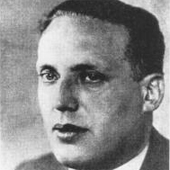
Józef Koffler
d. 1944, Krosno
Józef Koffler is today considered the most important pioneer of Contemporary Music in Poland. He was born in Stryi, Galicia, in 1896 and went to Vienna in 1914 to study law and music (composition, conducting, and musicology). After military service in the Austrian army, he earned a doctorate in 1923 under Guido Adler with a dissertation on "orchestral color in the symphonic works of Mendelssohn," and settled in 1924 in Lvov, where he held the then only professorship in Poland for atonal compositional techniques. Koffler, who had become friends with Alban Berg in Vienna, never personally met Arnold Schoenberg, with whom he corresponded starting in 1929 and as whose pupil he is sometimes referred to. The occupation with Schoenberg’s method was however decisive for his works, and indeed starting already in 1926, thus making him one of the pioneers of dodecaphony. After the annexation of western Ukraine by the USSR in September 1939, Koffler assumed the professorship for composition at the State Mykola Lysenko Conservatory and the post of prorector. That same year he was appointed as secretary of the Composers’ Association of Soviet Ukraine. There followed a short period of secure existence and professional stability, even though he was compelled to bow to the dictates of socialist realism following an accusation of formalism. After the capture of Lvov by the Germans in 1941, he and his family were resettled in the Wieliczka ghetto. The circumstances of his death are still not completely clear. After the liquidation of the ghetto, the family was apparently able to hide near Krosno, where they were discovered by a German Einsatzgruppe (deployment group) and killed at the beginning of 1944. Through his student Roman Haubenstock-Ramati, he indirectly influenced the Austrian avant-garde of the second half of the 20th century. (Frank Harders-Wuthenow, translation: Howard Weiner)
